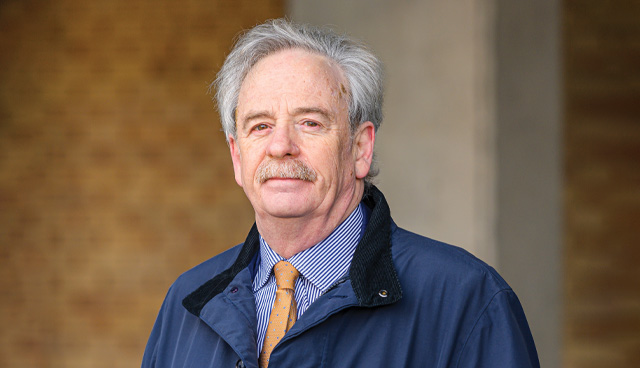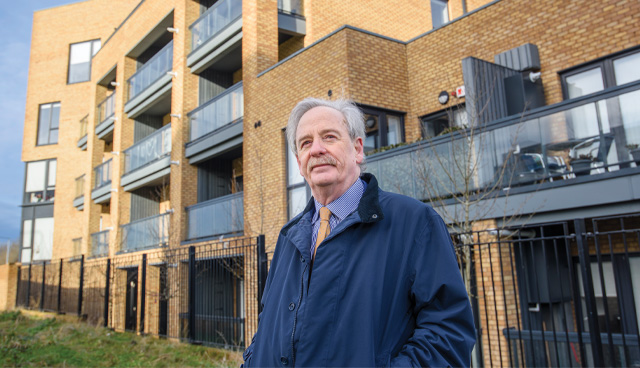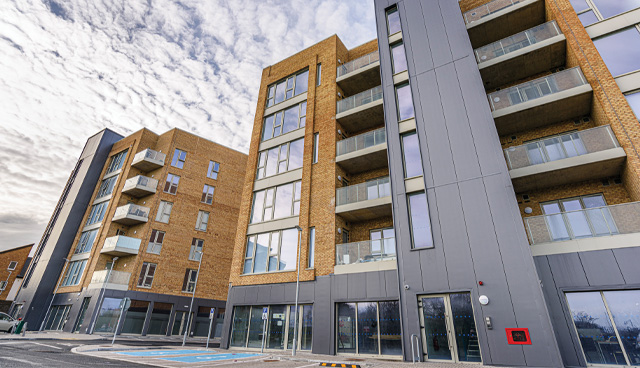Operating at scale: Building homes and communities

Despite what was a difficult year for the economy and society, Respond delivered 681 social housing units in 2020 and at the close of the year had 1,324 homes in construction. Ciarán Galway engages with Respond CEO Declan Dunne to discuss delivery, diverse expertise and developing thriving communities.
Respond housing association and service provider has a dual strategy of “building homes, improving lives”. As one of Ireland’s largest approved housing bodies (AHBs), Respond is unique in providing a wide range of services alongside its housing construction and housing management. These include Daycare for Older People Services, Early Childhood Care and Education Services, Family Homeless Services, Family Support, and Refugee Resettlement Services.
“Our first priority is to add to the national housing stock,” CEO Declan Dunne asserts, adding: “In 2020 alone, Respond increased the number of social housing units we own or manage by 681. Of those, 109 are homes we manage for iCare Housing.”
Since its foundation Respond has built over 6,500 properties which includes social housing, affordable housing for local authorities, community buildings and group homes. Approximately 11,313 tenants live in 5,497 homes that Respond either owns or manages nationally.
Prior to Christmas 2020, the approved housing body had 1,324 homes in construction. These represent homes that Respond has commissioned rather than acquired from developers under Part V of the Planning and Development Act, Dunne remarks: “These are not insignificant numbers.”
Lockdown
As a result of the Covid-19 pandemic and the latest public health restrictions, construction ceased in January 2021, with some exceptions. Expressing support for the lockdown measures and the prioritisation of life and health, the Respond CEO outlines the figures for his organisation’s exempted ‘essential’ social housing projects.
“As of January 2021, there are 459 homes that we can continue to build for families and individuals who urgently need them. There may be more added to that figure once they meet the required criteria.
“One criterion for opening these sites is that they need to be delivered by the end of February 2021. We had to urgently review our ongoing projects to see what could be delivered by that deadline. We were surprised and delighted; if we delivered 681 units in 2020, it’s a great achievement that we’ll have 459 completed in the first two months of 2021.”

“We operate at scale to deliver homes for people who need them. We have real construction expertise in our professionals while also having the financial expertise and resources to fix the price and deliver the houses.”
However, another Respond project of 153 homes on the Long Mile Road in Walkinstown has now been halted. Likewise, at the approved housing body’s site at Charlestown in Dublin, a project comprising three apartment blocks totalling 138 units will also be impacted. Only two of the three blocks have been designated as essential, meaning that 94 of the 138 units will be completed by the end of February.
Similarly, a pathfinder project for affordable cost-rental homes on Enniskerry Road in Stepaside, Dublin 18 did not qualify for essential status although it incorporates 50 cost rental homes, alongside 105 social homes. “This project is well on the way to being delivered this year as per the plan,” says Dunne.
Presently, the Covid-19 pandemic is the most significant obstacle to the delivery of high-quality homes at scale. “We have scheduled completion dates for October, November and December 2021. If we were to lose two or three months now, early in 2021, how many projects will then not be completed until 2022?
“A typical construction cycle, depending on the scale of the development is at least two years. The biggest concern, therefore, is that if we do not start construction on sites on where groundwork has already commenced, the 2022 or even the 2023 figures may be impacted.”
Internal expertise
While 2020 was a challenging time, it was also a successful year for Respond as the organisation sought to enhance its diverse internal expertise.
“Firstly, Respond operates at scale,” Dunne emphasises, elaborating: “For example, setting our target for 2019 to 2023, the board initially said, ‘focus on 2,500 homes or 500 per annum.’ Then, last year, the board agreed ‘this should be increased to 3,500 homes or 700 homes per annum.’ We have now added an extra 1,000 and our current pipeline totals €1.25 billion. We will meet that target.”
“Secondly, we have the construction expertise to operate at scale. For instance, we have 22 staff in our design team. This team is led by its Head of Development Parag Joglekar, a very senior architect, and we have recently recruited a senior Deputy Head of Development, who was a chartered surveyor and a qualified barrister, to work alongside him. There are 20 other architects, quantity surveyors and planners in that team. We couldn’t do what we do well without those professional skills.”
“Ultimately our goal is to build homes and support thriving communities where people want to live throughout their lifecycle.”
Simultaneously, Respond has utilised its financial expertise to develop a model whereby the approved housing body buys a site, agrees a fixed price for the homes, and makes staged payments as the project progresses. This cuts the cost of construction and guarantees delivery, while saving the costly interest during the construction phase.
“Our financial arrangements save us up to €30,000 on every house. Likewise, it ensures the homes will be completed and delivered to Respond tenants rather than sold on completion to others who may be willing to pay a higher price,” Dunne explains.
“We operate at scale and we have real construction expertise in our professionals while also having the financial expertise and resources to fix the price and deliver the houses.”
Thriving communities
Respond’s overarching vision is that “every family and individual in Ireland will have high-quality housing as part of a vibrant and caring community”. This means considering the concept of community from a tenant’s perspective.
“Will there be playgrounds, open spaces, nearby amenities and how much will it cost? There are many lessons which will emerge from the pandemic and the biggest issue will probably be mental health and wellbeing and how to support people in their homes and communities” Dunne observes.
Consequently, over the last year, Respond has invested in evidence-based services, partnering with two organisations which, according to the Respond CEO, “will help us to qualitatively change what we’re doing”.
The first of these innovative partnerships is with the Centre for Effective Services (CES). “Respond is going through a 13-month programme of ensuring that its services are evidence-based. It is about knowing that when we take a particular set of steps in a particular order and on a consistent basis, we will get a particular result. We’re opening ourselves up to national and international evidence,” he outlines.
The second partnership is with the Global Brain Health Institute (GBHI) based in Trinity College Dublin. “Many people will be familiar with neuroscientist Professor Ian Robertson who is the co-director there. We are very fortunate to be partnering on a pilot brain health training programme for some of our staff. The programme will enhance awareness and understanding of the importance of brain health and how all stakeholders together can best cultivate their own brain health and that of the larger community.
“In addition, we will also be co-hosting a series of joint seminars this year with GBHI which will be online and available to others. We’re sharing the learning with other people in the housing sector, not just in Ireland, but internationally and we are very excited about it,” the Respond CEO notes.
In addition, Respond is building 101 apartments on its Gracepark Road site and, in a first for Ireland, is contracting the GBHI’s fellows and specialist architects to add their expertise to the design team, ensuring that both the internal and external environments of the new homes will be conducive to brain health principles.
“Similarly we are also interested in exploring the redesign of our Daycare for Older People Services, implementing universal design principles. The new universal design is about cognitive limitations rather than physical limitations. So, we are planning on redesigning the interiors of our three older care services,” he adds.
Affordable rental
For many years, Respond has advocated for a sustainable and replicable model to deliver affordable rental homes. Indeed, a key goal of Respond’s strategic plan is affordable housing for people who do not qualify for social housing while simultaneously are unable to access a mortgage. Naturally, the approved housing body has welcomed the Cost Rental Equity Loan (CERL), as committed to in the Programme for Government and latterly in Budget 2021.
“This is a positive development, and it does have the potential to transform our housing delivery in Ireland. What’s transformative about the current affordable rental scheme is that the State has put aside €35 million to provide for 30 per cent of the cost of these homes. The Housing Finance Agency, which does much of our financing, is also making available €100 million. This money could fund 350 more homes, alongside the 50 homes at Enniskerry Road.

“There is only one aim: reducing the rent for people who are paying too much in the private rental sector. So, stretching the financing out with very low interest rates over a longer period and then having this secondary State loan is a significant development. You’re talking about rents that are 30 per cent below market rate which is pretty good,” Dunne says.
Before Christmas 2020, the Department of Housing, Local Government and Heritage announced a ‘call for proposals’ and Respond submitted three schemes. Subsequently, the AHB has been selected for participation in the CERL scheme.
While conceding that 350 homes is not a large number, the Respond CEO suggests that the initial allocation of €35 million will help prove the concept of the scheme and potentially lead to increased allocations in budgets 2022 and 2023.
Vision
Looking to the future, the Respond CEO moves the discussion back towards community development. At its core, Respond is preoccupied with its tenants’ lived experience. “We have cracked the housebuilding bit and we’re absolutely flying now; we’re going to meet our 3,500 homes target, there’s no doubt about that,” he says, adding: “Now, the question is: what more can we do to ensure that these are thriving communities in which tenants are heard and supported?”
Respond is cognisant of a change in the social housing model towards more apartments and bigger clusters. Larger-scale developments offer new challenges for both tenants and management to ensure that they are desirable places to live.
“We want to allow people to thrive, but we are also mindful of our obligations under the Residential Tenancies Act. Therefore, we must be proactive in pre-emptively securing tenant participation and consensus on what makes a good community,” he says.
This necessitates a balance between care and boundaries. Respond has a programme for engagement with its tenants which defines responsibilities. “This is where our housing team, led by Head of Housing, Neil Bolton, steps in and facilitates that through engagement with tenants themselves. We apply that balance between care and boundaries in our services to co-create this programme with our tenants, rather than simply dictating the rules. We ask, ‘this is going to be your community; how do you want it to do things?’
“Most people in social housing are doing fine; they are paying their rent regularly and don’t require much support aside from maintenance of their homes. However, every so often, there are individuals or families who are struggling because of physical and mental health, relationship breakdown and employment concerns. With so many staff in services, Respond is uniquely placed as an organisation to go the extra mile, to understand the challenge in the first instance. With diverse expertise across Respond’s structures, our architects, engineers and estate managers are able to learn from our social care workers and vice versa.”
Overall, reflecting on Respond’s dual housing delivery and community development priorities, Dunne concludes: “Ultimately our goal is to build homes and support thriving communities where people want to live throughout their lifecycle.”





